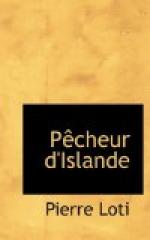When, in the eighteenth century, minds became emancipated from the narrow restrictions of religious discipline, and when method was introduced into the study of scientific problems, Nature took her revenge as well in literature as in all other fields of human thought. Rousseau it was who inaugurated the movement in France, and the whole of Europe followed in the wake of France. It may even be declared that the reaction against the seventeenth century was in many respects excessive, for the eighteenth century gave itself up to a species of sentimental debauch. It is none the less a fact that the author of La Nouvelle Heloise was the first to blend the moral life of man with his exterior surroundings. He felt the savage beauty and grandeur of the mountains of Switzerland, the grace of the Savoy horizons, and the more familiar elegance of the Parisian suburbs. We may say that he opened the eye of humanity to the spectacle which the world offered it. In Germany, Lessing, Goethe, Hegel, Schelling have proclaimed him their master; while even in England, Byron, and George Eliot herself, have recognised all that they owed to him.
The first of Rosseau’s disciples in France was Bernardin de St. Pierre, whose name has frequently been recalled in connection with Loti. Indeed, the charming masterpiece of Paul and Virginia was the first example of exoticism in literature; and thereby it excited the curiosity of our fathers at the same time that it dazzled them by the wealth and brilliancy of its descriptions.
Then came Chateaubriand; but Nature with him was not a mere background. He sought from it an accompaniment, in the musical sense of the term, to the movements of his soul; and being somewhat prone to melancholy, his taste seems to have favoured sombre landscapes, stormy and tragical. The entire romantic school was born from him, Victor Hugo and George Sand, Theophile Gautier who draws from the French tongue resources unequalled in wealth and colour, and even M. Zola himself, whose naturalism, after all, is but the last form and, as it were, the end of romanticism, since it would be difficult to discover in him any characteristic that did not exist, as a germ at least, in Balzac.




